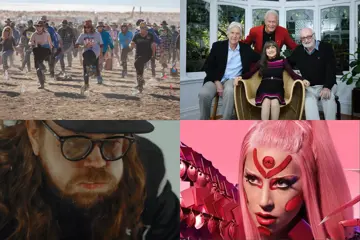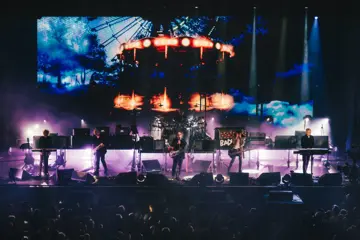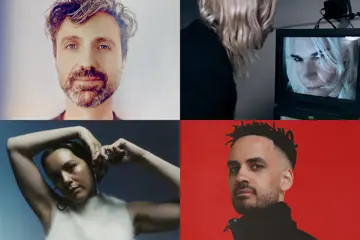Arguably one of the stronger growth areas for musicians to ply their creative talents, composing for the screen – both film and TV – is finding a growing recognition amongst the Australian music scene.
The likes of The Go-Betweens' Amanda Brown, The Mess Hall's Jed Kerzel, François Tétaz (who produced Gotye's world-beating Making Mirrors and as well albums by Kimbra, Architecture In Helsinki and Spiderbait) and '90s electronic songwriter Josh Abrahams (who wrote the hit Addicted To Bass as Puretone before working with Moulin Rouge) have all carved out careers in the screen composing world.
Their achievements – as well as those of Custard's Dave McCormack and Dead Can Dance's Lisa Gerrard – will be recognised at the APRA Screen Music Awards in Sydney next week. Today the Awards have announced that as well as The Chaser's Andrew Hanson and Chris Taylor, Rachel Ward, John Waters, Jacqueline McKenzie, Matilda Brown, Ilan Kidron and Samantha Rebillet will be presenters at the awards, taking place at The State Theatre Monday 9 December.
For the first time the awards are open to the public, with tickets available here.
Before the awards take place, we caught up with Abrahams, Brown, Tétaz and Kurzel to get a bit of an insight into switching over to the screen-side…
SEE THE FULL LIST OF NOMINATIONS HERE
WHAT GOT YOU INTO WRITING FOR THE SCREEN?
Josh Abrahams: “My first screen job was for a high school student film. I was a passenger in a car crash midway through the project and had to complete the score with my right arm in a sling. That was an interesting challenge. From there I pretty much jumped 12 years to my next main screen music experience, being Moulin Rouge. I met Baz [Luhrmann, director] through remixing some of his precious work on the album Something For Everybody, and harassed him so thoroughly that he finally gave in and asked me to move to Sydney to work on the film, which I did (for four years).”
Don't miss a beat with our FREE daily newsletter
Amanda Brown: “After completing a music degree at the University Of Western Sydney I felt I needed further specialisation and a friend suggested the AFTRS screen composition course. It was the inaugural year and we were the guinea pig students. In retrospect I always had an interest in the visual arts. I helped to produce an independent magazine with arty inner city friends in my late teens and my first full time job was in animation. My first band was comprised of artists and we played at warehouse parties with old Russian silent film projections, performance artists and live painting demonstrations – very 'The Factory!'”
François Tétaz: “I was mentored by Paul Schutze who was writing film scores at that time. That experience exposed me to cinema and film on another level. Paul took me to Philip Brophy's lecture on the sound for Sean Penn's Colours when I was 20 or so. From there I wrote scores for short films. Brophy has an immense library of film and an extremely deep knowledge of music and sound in film. It fascinated me and has stayed with me ever since.”
Jed Kurzel: “It was something I fell into. I had been working collaboratively with my brother [Justin Kurzel] on a number of different things, music clips, short films etc. When it came time for him to make his first feature film – Snowtown – we had already developed a shorthand so it seemed like a natural progression for us to work together again.”
DO YOU ALREADY HAVE FOOTAGE WHEN YOU COMPOSE?
JA: “Sometimes yes, sometimes no. Every job is different. With the stop-motion animation Woody, there was only rough animatics for a large part of the process due to the fact that it takes weeks to produce just a few seconds of footage, so I did much of the writing to hand drawn sketches. That worked fine though, the director was very hands-on through the whole scoring process so I was always clear on the emotions and tone we were aiming for.”
AB: “As a general rule I do have footage to compose to. Although lately I've had a couple of documentary commissions where I have been asked to provide musical themes (almost like a library music approach but written specifically for that particular film) and I provide stems to the editor so they have original music to work with rather than temporary music. That is usually because there is a tight post-production period and limited time with the director.”
FT: “Sometimes yes, sometimes no. I like to start early, sketch and think at the script stage. Then when footage arrives I have some material to bounce off. It allows me to make some studies. But sometimes (like Underground) the process is moving so fast that is not possible.”
JK: “Yes, the only time I tried composing without the footage, it didn't work. Any footage can be helpful, even if it's just rushes. If a director has a strong vision, you can usually get a feel for the tone of the film really early on.”
THE DIFFERENCE BETWEEN COMPOSING FOR SCREEN
JA: “I had it drilled in to me when working on Moulin Rouge, if the music doesn't serve story, it's out. We could (and did) often develop the most complex, beautiful sounding ideas for a cue, but when placed against the picture and dialog, sometimes they just didn't help tell the story – and they were out. And there were occasions when a piece had been mangled, sped up, slowed down again, chopped up and resampled, and sonically it sounded pretty rough and lo-fi, but it brought the pictures to life, so it was in. It's a critical lesson.”
AB: “The biggest difference is the brief. In film the music brief is very defined. It must fulfill specific requirements in terms of duration, emotion and texture. It has to support the narrative and manage to complement the story without distracting from it. Personally I find these creative restrictions paradoxically liberating. Writing music for its own sake the brief is completely open unless you set yourself some guidelines.”
FT: “Film is a collaboration. The music is there to inform the film in some way, meaning the music serves the story – the intent of the film and director. Depending on how you look at it, it can be frustrating/limiting or liberating. For me I don't find it limiting but I have to love the project!”
JK: “Allowing the other cinematic elements to inform your decisions, whether it be cinematography, design, performance, sound or editing. They act as boundaries but they are also very freeing and move you away from the rigid structure of song based writing. With film music, you always have film to answer to.”
WHAT SCORE HAD THE BIGGEST IMPACT ON YOU?
JA: “I grew up watching Dr Who and Lost In Space, so I was raised on weird electronic noises and orchestral clusters as tools for emotional expression. I'm not sure how it affected my own composition, but I know that I decided to own a recording studio because it was the closest I'd ever get to being in the Tardis!”
AB: It's hard to definitively say what score has had the biggest impact on me, there are so many at different stages of development. I was terrified of the Dr Who theme as a child. I was an unfashionable teenager and loved films like Amadeus and Farinelli that introduced me to period music. Later I was captivated by minimalism and the scores of Michael Nyman and Philip Glass. Right now I'm absolutely loving the music for French television series The Returned by Mogwai.”
FT: “When I was a kid I can remember American '70s TV themes – Hill Street Blues, The Rockford Files, Dallas, Happy Days, Chips and The Wombles, The Sullivans, Prisoner and the ABC news theme. I grew up on mainstream mall movies – Star Wars, Ghost Busters, Blues Brothers, Back To The Future, Rocky Horror. When I was 15 I watched David Lynch's Blue Velvet and thought, 'Qhat the hell is cinema?' thanks to Guy Davis. From there it's a list – Stanley Kubrick, any film with scores by Morricone, Mancini, Bernard Hermann or Toru Takemitsu, Jerry Goldsmith, John Barry…”
JK: “When I was a teenager, there was a month when SBS were playing '70s Italian horror films late at night. Half the time I had no idea what I was watching but these were some of the most interesting and innovative films I'd ever seen. Music played a huge part in why I liked them so much and the score for a film called Who Saw Her Die particularly stood out. After doing some research (pre-internet, so it took a while) I found out the composer was this guy called Ennio Morricone. The same guy who'd just blown my teenage mind with some of the most fucked up music I'd ever heard had also composed the score for The Mission… Brilliant!”















